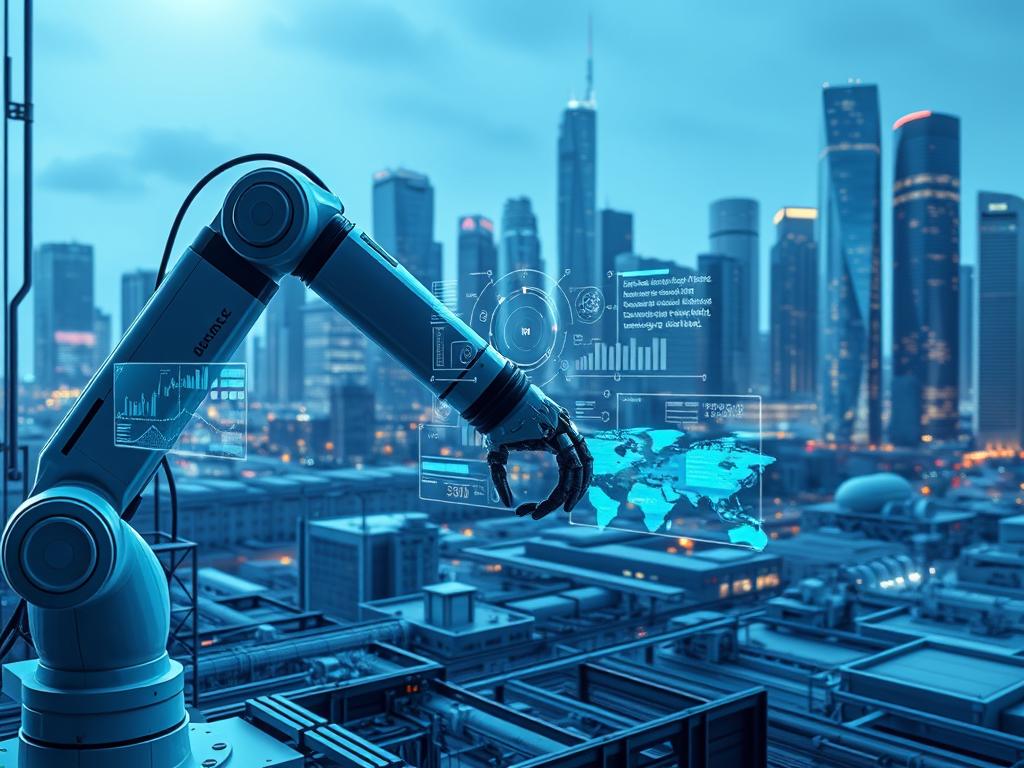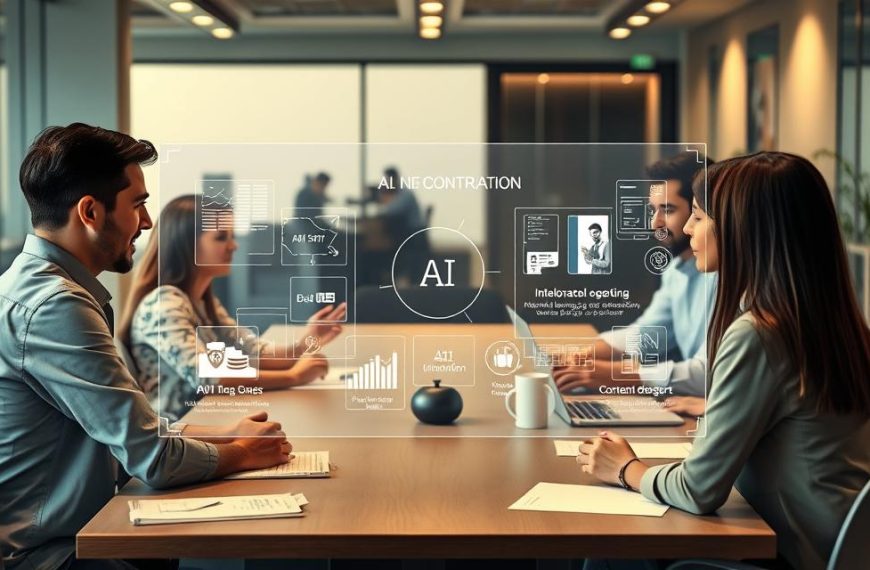AI workflow automation is reshaping how businesses operate in today’s digital world. Companies are using intelligent automation to streamline complex processes and boost productivity. This approach drives strategic innovation and enhances organisational efficiency.
AI-powered tools now handle intricate tasks that once required extensive human input. They process vast amounts of data quickly and accurately. This shift allows businesses to focus on more strategic work.
Various sectors are tapping into AI-driven automation’s transformative power. It’s making waves in customer service and supply chain management. Intelligent automation reduces errors, optimises resources, and creates more responsive workflows.
Gartner forecasts that by 2026, 20% of organisations will use AI for critical management tasks. This trend highlights AI’s growing role in boosting operational performance. It also shows how AI can unlock new levels of strategic potential.
The business world’s future lies in embracing intelligent automation. This powerful approach merges technological innovation with human creativity. It drives unparalleled efficiency and gives companies a competitive edge in the market.
Understanding AI-Powered Business Process Automation
Artificial intelligence is transforming business operations. AI-powered business process automation is revolutionising workflow efficiency. It uses cutting-edge tech to streamline complex operational challenges.
Intelligent automation surpasses traditional workflow management. It integrates machine learning, natural language processing, and robotic process automation. This creates adaptive systems that continuously learn and improve.
Core Components of AI Business Automation
AI business automation relies on three key technologies:
- Machine Learning: Algorithms that enable systems to learn from data patterns
- Natural Language Processing: Technology facilitating human-machine communication
- Robotic Process Automation: Software that handles repetitive tasks with precision
Key Technologies Driving Automation
Modern AI technologies are reshaping business processes across industries. These intelligent systems analyse vast datasets to:
- Predict customer behaviour
- Optimize operational workflows
- Enhance decision-making capabilities
Evolution of Automation Technologies
| Traditional Approach | AI-Enhanced Approach |
|---|---|
| Rule-based systems | Adaptive, learning systems |
| Manual process management | Intelligent automated workflows |
| Limited scalability | Infinitely scalable solutions |
The global market for automating business processes is growing rapidly. It’s expected to rise from $13.7 billion in 2023 to $41.8 billion by 2033. This highlights the transformative potential of AI-driven automation strategies.
How is AI Impacting Business Process Automation

AI is transforming business process automation with real-time decision making. It’s changing how companies operate by adapting to market shifts quickly. This new approach allows for precise and dynamic responses.
AI automation creates smart systems that learn and improve constantly. It enables businesses to scale their operations without massive cost increases. These systems learn and optimise continuously, making them highly efficient.
“AI doesn’t just automate processes; it intelligently reimagines how work gets done.”
- Real-time data analysis for instant business insights
- Predictive capabilities that anticipate operational challenges
- Intelligent workflow adaptation
- Reduction of manual intervention
AI-driven automation streamlines complex tasks that challenge traditional systems. It excels in areas like sentiment analysis and inventory management. This technology allows businesses to operate with remarkable efficiency.
The future of automation lies in self-learning systems. These systems will continuously improve performance. They’ll also reduce operational friction, making businesses more agile.
Essential Benefits and ROI of AI Workflow Integration
AI workflow automation transforms organisational performance, boosting efficiency across business domains. It unlocks remarkable potential for strategic advancement and competitive edge. Enterprises embracing this technology gain significant advantages.
AI-driven automation yields substantial improvements in key performance metrics. It enables businesses to reimagine traditional workflow structures. This leads to significant operational enhancements.
Measurable Performance Improvements
AI technologies offer concrete performance advantages through precise capabilities:
- Increasing labour productivity by up to 27% in manufacturing sectors
- Reducing processing times through intelligent automation
- Minimising human-related errors with advanced algorithmic processes
- Enabling real-time data analysis for rapid decision-making
Enhanced Decision-Making Capabilities
“AI transforms data into actionable insights, empowering organisations to make strategic choices with unprecedented precision.”
Predictive analytics and machine learning provide sophisticated tools for error reduction. These algorithms optimise time and enable data-driven insights. Businesses can anticipate market trends, customer behaviours, and potential challenges.
Cost Savings and Resource Optimisation
AI workflow automation generates substantial economic benefits through intelligent resource allocation. By automating repetitive tasks, organisations can achieve significant improvements.
- Reduce manual labour costs
- Redirect human talent towards high-value strategic initiatives
- Achieve scalable solutions without proportional resource expansion
- Improve overall operational efficiency
Research shows AI workflow automation could add $6.6 trillion to the global economy by 2030. This highlights its transformative potential for businesses worldwide.
Implementation Strategies for AI Automation Success

Successful AI integration needs a strategic approach. It must address change management and employee training. Organisations should plan carefully to navigate the complex landscape of technological transformation.
Key implementation strategies include:
- Conduct a comprehensive data audit to assess current infrastructure
- Develop a robust employee training programme
- Start with targeted pilot programmes
- Establish clear success metrics
- Create an ethical AI framework
Change management is vital for AI automation success. AI can cut operating costs by 20-40%. It can also boost corporate productivity by up to 30%.
Gradual implementation helps minimise resistance. It also maximises adoption. Employee training is crucial in this transformation.
Upskilling teams helps them understand AI technologies. It also shows the potential benefits. Companies should invest in learning programmes that demystify AI integration.
The key to successful AI automation is viewing it as a collaborative journey between technology and human expertise.
AI implementation is a continuous process. Strategies should allow for incremental improvements. They should also support ongoing learning and adaptive technology integration.
Businesses must prioritise transparent communication. They should provide robust support. This approach helps navigate the complexities of AI-driven workflow transformation.
Conclusion
AI-driven innovation is reshaping business transformation. Companies using workflow automation are leading the charge in technological advancement. They’re unlocking new levels of efficiency and strategic potential.
AI-powered automation goes beyond operational improvements. It’s a fresh approach to productivity. Streamlining tasks and enabling real-time decisions can cut operational costs by 40%. This also boosts competitiveness in dynamic markets.
The future of work isn’t about replacing humans. It’s about enhancing their abilities. AI systems create opportunities for employees to focus on creative, strategic initiatives. This drives genuine value for businesses.
Companies investing in AI will be ready for tomorrow’s challenges. They can turn potential disruption into sustainable growth. Continuous learning and adapting to new tech are crucial.
Viewing AI as a collaborative tool unlocks remarkable potential. It propels organisations towards a more innovative and efficient future. Embracing AI is key to staying ahead in the digital age.
FAQ
What is AI-powered business process automation?
AI-powered business process automation uses advanced tech to streamline workflows. It employs machine learning, natural language processing, and robotic process automation. These intelligent systems learn, adapt, and perform tasks with remarkable efficiency and accuracy.
How does AI differ from traditional automation methods?
AI-driven automation is dynamic and adaptive, unlike rule-based systems. It learns from data and improves over time. This allows businesses to create flexible workflows that respond swiftly to market changes.
What key technologies drive AI business automation?
Machine learning algorithms enable systems to learn and improve. Natural language processing facilitates smooth human-machine interactions. Robotic process automation handles repetitive tasks with exceptional precision and efficiency.
What benefits can organisations expect from AI workflow integration?
Organisations can achieve significant improvements with AI workflow integration. These include reduced processing times and elimination of human errors. It also enhances decision-making capabilities and leads to substantial cost savings.
AI frees up human talent for more creative and strategic tasks. This allows employees to focus on high-value activities.
How can businesses successfully implement AI automation?
Successful AI implementation requires comprehensive change management strategies. Create robust training programmes and start with pilot projects. Establish clear success metrics and gradually scale AI integration across the organisation.
Is AI automation suitable for all business sizes?
AI automation can be scaled to suit businesses of all sizes. It works for small enterprises and large corporations alike. Start with targeted, manageable projects and expand based on specific organisational needs.
What challenges might organisations face when adopting AI automation?
Common challenges include employee resistance to change and skills gaps. Initial implementation costs and comprehensive training needs can also be hurdles. These issues can be addressed through strategic planning and clear communication.
How quickly can businesses see returns from AI automation?
Return on investment varies for AI automation. Many organisations report efficiency gains within 6-12 months of implementation. The key is selecting the right processes aligned with specific business goals.









